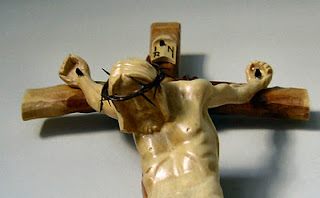Many thanks for your questions. I think one of them was the same as asked in the last post so perhaps I didn't answer that. My bad! Let me give it another shot!
First, though, are religious Sisters jealous of CV's (living in the world) being Brides of Christ? No, not at all, at least I have not met one. Most Sisters know they are espoused to Christ and value it beyond saying, but we don't tend to want to be recognized for it of itself. Instead, though our experience of Christ may be nuptial in character (it is not always so), we want to be known for our hearts, our compassion, our availability, and all the ways any degree of union with Christ is evidenced in our lives and ministry. Otherwise, being espoused to Christ means very little. Many Sisters today have difficulty with the bridal imagery associated with religious life and that is fine; it simply does not match their experience in prayer or may have resonances which are otherwise problematical. Again, they love Christ and want to be known for the quality and expansiveness of their hearts, for the compassion they have for all of God's creation, for the energy and intelligence they spend on others for the sake of the Kingdom, for their discipleship. And they are. There is no reason whatsoever to be jealous.
The canonist I have been speaking with about the uniqueness of CV's identity as Brides of Christ believes this identity is rooted in a true and everlasting bond which is unlike that of Religious. I don't believe her intention is to strip Religious of their identity in this way so much as it is to sufficiently recognize and honor the nature of the vocation to consecrated virginity lived in the world. However, I am not speaking here of the virtue of her academic work or her personal motivations (which I think are valid and necessarily limited as all such work is) so much as I am speaking of the ramifications such work could have, and even more, of the reasons I have seen for others' attempts to strip religious of their identity as Brides of Christ (e.g., Religious are only engaged to Christ (built on a misunderstanding the word betrothed in regard to Jewish marriage practice) while CV's are Brides, Religious consecrate themselves with vows while CV's are consecrated by God, or the bond of the consecrated CV is eternal while that of consecrated religious is not).
The reasons underlying what I believe is a lopsided emphasis on Bride of Christ imagery and identity are multiple. Too often CV's have been treated as women without the courage or ability to "go the whole way" into religious life. As is true with any "new" (though ancient) vocation, the bulk of the faithful neither understand nor honor this calling. As I myself once wondered about the validity and meaning of this vocation so does the majority of the Church wonder about the same things. The renewal of this vocation too often seems an act by which the Church is attempting to mobilize a new army of workers to replace Religious whose numbers are diminishing, a kind of stopgap vocation to increase or at least harden the division between male priesthood and the role of women in the Church, or a form of "religious life lite" to many of the faithful. At the same time, the faulty use of the term "consecration" for an act humans commit has led to all manner of "consecrations" which tend to empty the Divine consecration shared by consecrated persons in the Church of meaning and import.Everyone in the Church should be aware that in baptism and all forms of life known as "consecrated", God is the one who consecrates while the human person dedicates him/herself via some form of profession or private vow. That is especially true of public commitments. Unfortunately, it is possible to find CV's asserting that their consecration is by God while Religious "consecrate themselves via vows"! (Even more unfortunately, one can find religious congregations referring to members being consecrated via profession which then morphs into "religious consecrate themselves via profession.) The former emboldened expression is useful as synecdoche, a figure of speech where one part stands for the whole, as either the term profession or the term consecration refers to the whole event involving both the making of vows and the assumption of a new state of life via divine consecration mediated by the Church. The reference to "consecrating oneself", however, is inaccurate when used instead.
What is disappointing to me is the apparent bare nod to secularity I find in the work of most CV's writing about their own vocations today. Even the USACV (United States Association of Consecrated Virgins) provides only the barest information on the secularity of the vocation, largely limiting that to the idea that CV's living in the world are responsible for their own upkeep and the individual nature of their ministries. But the meaning and value of a secular vocation is far richer and of much greater contemporary and theological import than this! Besides, solitary hermits under c 603 are also responsible for our own upkeep and we are definitely not secular vocations. Still, I have yet found no theological reflection on the timeliness of sacred or eschatological secularity and none at all regarding the important shift to an eschatology stressing the interpenetration of the Kingdom of God with that of this world or the promise that one day God will be all in all. In light of these significant lacunae, discussions of whether or not the bond of the CV is eternal or whether religious are also truly Brides of Christ strike me as theologically analogous to the Church spending time and energy in quibbles over how many angels can dance on the head of a pin in the face of global disaster.
The vocation to consecrated virginity lived in the world is real and meaningful (potentially it is profoundly significant and enormously timely), but it cannot remain or truly be that if CVs' reflection on and living out of their vocation is limited to emphasizing a single dimension of this call (espousal to Christ) cut off from the equally necessary secular dimension of that same vocation. I have said previously that the CV's secularity is profoundly qualified by espousal; I should also say, then, that the espousal itself is profoundly qualified by secularity. These two dimensions mutually qualify one another in a single radical consecrated vocation. To miss or eschew this is to miss the nature of the whole. Only in this way do they represent an icon of the Church we so badly need today and see called for by an emerging and deeply Scriptural eschatology.
By the way, you asked why I don't undertake this work. Let me say that I have a definite theological and pastoral interest in it, especially in terms of the eschatology involved and the way that is combined with the significance of secular vocations, but for the present I am working on a project re the discernment and formation of c 603 eremitical vocations. An occasional post in response to questions will have to do for the present. Still, given the way Pope Francis is acting to end clericalism (cf., Praedicate Evangelium) there may be an added impetus to reflect more thoroughly on secularism and eschatological secularity in the near future.












.jpg)
























































